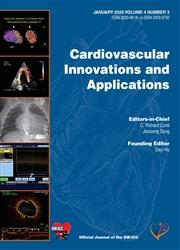Efficacy and Renal Tolerability of Ultrafiltration in Acute Decompensated Heart Failure: A Meta-analysis and Systematic Review of 19 Randomized Controlled Trials
IF 0.9
4区 医学
Q4 CARDIAC & CARDIOVASCULAR SYSTEMS
引用次数: 1
Abstract
Background: Acute decompensated heart failure (ADHF) is a life-threatening and costly disease. Controversy remainsregarding the efficacy and renal tolerability of ultrafiltration for treating ADHF. We therefore performed thismeta-analysis to evaluate this clinical issue.Methods: A search of PubMed, EMBASE, and the Cochrane database of controlled trials was performed from inceptionto March 2021 for relevant randomized controlled trials. The quality of the included trials and outcomes wasevaluated with the use of the risk of bias assessment tool and the Grading of Recommendations, Assessment, Developmentand Evaluation (GRADE) approach, respectively. The risk ratio and the standardized mean difference (SMD) or weighted mean difference (WMD) were computed and pooled with fixed-effects or random-effects models.Results: This meta-analysis included 19 studies involving 1281 patients. Ultrafiltration was superior to the controltreatments for weight loss (WMD 1.24 kg, 95% confidence interval [CI] 0.38–2.09 kg, P = 0.004) and fluid removal(WMD 1.55 L, 95% CI 0.51–2.59 l, P = 0.003) and was associated with a significant increase in serum creatinine levelcompared with the control treatments (SMD 0.15 mg/dL, 95% CI 0.00–0.30 mg/dL, P = 0.04). However, no significanteffects were found for serum N-terminal prohormone of brain natriuretic peptide level, length of hospital stay, all-causemortality, or all-cause rehospitalization in the ultrafiltration group.Conclusions: The use of ultrafiltration in patients with ADHF is superior to the use of the control treatments for weight loss and fluid removal, but has adverse renal effects and lacks significant effects on long-term prognosis, indicatingthat this approach to decongestion in ADHF patients is efficient for fluid management but less safe renally.超滤治疗急性失代偿性心力衰竭的疗效和肾脏耐受性:19项随机对照试验的荟萃分析和系统评价
背景:急性失代偿性心力衰竭(ADHF)是一种危及生命且代价高昂的疾病。关于超滤治疗ADHF的疗效和肾耐受性仍有争议。因此,我们进行了这项荟萃分析来评估这一临床问题。方法:检索PubMed、EMBASE和Cochrane对照试验数据库,从开始到2021年3月检索相关随机对照试验。分别使用偏倚风险评估工具和推荐、评估、发展和评价分级(GRADE)方法对纳入的试验和结果的质量进行评估。计算风险比和标准化平均差(SMD)或加权平均差(WMD),并采用固定效应或随机效应模型进行合并。结果:本荟萃分析纳入19项研究,涉及1281例患者。超滤组在减重(WMD 1.24 kg, 95%可信区间[CI] 0.38-2.09 kg, P = 0.004)和排液(WMD 1.55 L, 95% CI 0.51-2.59 L, P = 0.003)方面优于对照组,且血清肌酐水平显著高于对照组(SMD 0.15 mg/dL, 95% CI 0.00-0.30 mg/dL, P = 0.04)。超滤组血清脑利钠肽n端激素原水平、住院时间、全因死亡率、全因再住院均无显著影响。结论:ADHF患者超滤治疗优于对照组的减重、排液治疗,但对肾脏有不良影响,且对远期预后影响不显著,提示该方法对ADHF患者去充血的液体管理有效,但对肾脏的安全性较差。
本文章由计算机程序翻译,如有差异,请以英文原文为准。
求助全文
约1分钟内获得全文
求助全文
来源期刊

Cardiovascular Innovations and Applications
CARDIAC & CARDIOVASCULAR SYSTEMS-
CiteScore
0.80
自引率
20.00%
发文量
222
 求助内容:
求助内容: 应助结果提醒方式:
应助结果提醒方式:


